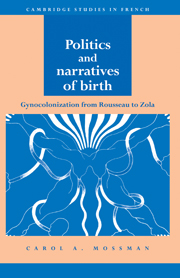Book contents
- Frontmatter
- Contents
- Acknowledgements
- A note on translations
- Introduction: conception of this book
- Cycle 1 Stendhal: delivering a plot
- Cycle 2 Production, reproductions, and narrative form: Adolphe
- Cycle 3 Gynocolonization: Rousseau, Michelet, Zola and the nineteenth-century French novel
- Conclusion
- Notes
- Bibliography
- Index
- CAMBRIDGE STUDIES IN FRENCH
Cycle 2 - Production, reproductions, and narrative form: Adolphe
Published online by Cambridge University Press: 22 September 2009
- Frontmatter
- Contents
- Acknowledgements
- A note on translations
- Introduction: conception of this book
- Cycle 1 Stendhal: delivering a plot
- Cycle 2 Production, reproductions, and narrative form: Adolphe
- Cycle 3 Gynocolonization: Rousseau, Michelet, Zola and the nineteenth-century French novel
- Conclusion
- Notes
- Bibliography
- Index
- CAMBRIDGE STUDIES IN FRENCH
Summary
introduction
In Schizoid Phenomena, Object-Relations and the Self, Harry Guntrip traces the evolution of psychoanalysis, noting that: “The Oedipus problem, as Freud saw it, was, in fact, the gateway opening back into the arena of the psychopathology of infancy” (p. 45). For those interested in the study and appreciation of literature, Guntrip's observation hints at the possibility of enhanced critical readings once a certain threshold, presented in fact as a barrier, has been crossed. Indeed, the implication is that oedipus, the classic skeleton supporting so many kinds of narrative, may function as a screen, and this in several ways.
First of all, it is a story whose sheer cultural weight is inescapable, a collective projection situated at the crossroads of history – Western history, at least – and which speaks to us of our own collective origins. Oedipus is a story which continues to impose itself on our attention. In The Unbearable Lightness of Being, for example, contemporary Czech novelist Milan Kundera causes his protagonist, Tomas, to fall into political disrepute for writing an article allegorizing oedipus and the situation of his occupied country. It is precisely in response to this article that Tomas' long-estranged son arranges to meet his father who, repeating a legendary failure, does not recognize him.
It has become increasingly clear that in reconstructing the oedipus myth along more modern lines, Freud failed, in considerable measure, to move beyond it, resisting Klein, Rank, Jung, and others whose work pointed to the existence of different stories.
- Type
- Chapter
- Information
- Politics and Narratives of BirthGynocolonization from Rousseau to Zola, pp. 72 - 138Publisher: Cambridge University PressPrint publication year: 1993



